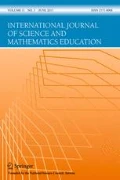Abstract
This professional development program was designed to prepare science teachers to be more student-centered and to implement newer goals for science instruction. These goals are to improve science teaching in ways that promote broader and longer-lasting learning. Secondary school science teachers in Korea are expected to follow a rigid national curriculum with large classes - often with more than 50 students. This study focuses on feedback and follow-up interaction with teacher participants who were enrolled in a month-long workshop in the U.S. before returning to Korea to implement the new ideas. Assistance was offered to help teachers develop teaching modules which were more constructivist while also assisting with assessment efforts that provided further evidence of use of the new teaching practices and their effect on student learning. Student mastery of concepts and improvement in student creativity were two aspects of the summer workshop experiences and these were evaluated to illustrate workshop effects on teacher participants in their actual classrooms.
Similar content being viewed by others
References
M.G. Brooks J.G. Brooks (1999) In search of understanding: The case for constructivist classrooms Association for supervision and curriculum development Alexandria, VA
J.A. Burry-Stock (1993) Expert science teaching educational evaluation model (ESTEEM) manual Center for Research on Educational Accountability and Teacher Evaluation (CREATE), Western Michigan University Kalamazoo, MI
J.A. Burry-Stock et al. (2000) ArticleTitleRussian/US comparison using the expert science teaching educational evaluation model (ESTEEM) International Journal of Science Education 22 IssueID(4) 419–433
J.I. Cho H.A. Seo (1997) ArticleTitleChanges in high school teachers’ constructivist philosophies School Science and Mathematics 97 IssueID(8) 400–406 Occurrence Handle10.1111/j.1949-8594.1997.tb17384.x
L.L. Cronin (1989) ArticleTitleCreativity in the science classroom The Science Teacher 56 IssueID(2) 34–36
Cross, C.T. (1991). Education research and development for teacher learning: Leadership roles. Speech presented at the annual meeting of the American Association of College for Teacher Education, Atlanta, GA. ED 336342.
L. Darling-Hammond M.W. McLaughlin (1995) ArticleTitlePolicies that support professional development in an era of reform Phi Delta Kappan 76 IssueID(8) 597–604
Dass, P. (1997). The Collier Chautauqua program: A formative evaluation of the implementation of the Iowa Chautauqua model of professional development and its effectiveness in improving science teaching. Ph.D. Dissertation, The University of Iowa.
Dilworth, M.E. & Imig, D.G. (1994). Professional teacher development and the reform agenda. ERIC Digest No. 94-1. Office of Educational Research and Improvement. ED 383694.
InstitutionalAuthorNameEisenhower National Clearinghouse (ENC) (1999) Ideas that work: Science professional development program Author Columbus, OH
K.E. Enger R.E. Yager (Eds) (1998) The Iowa assessment handbook University of Iowa Iowa City, IA
M.G. Fullan (1995) The limits and the potential of professional development T.R. Gusky M. Huberman (Eds) Professional development in education: New paradigms and practices Teachers College Press New York 253–267
Y. Gold (1996) Beginning teacher support: Attrition, mentoring, and education J. Sikula (Eds) Handbook of research on teacher education EditionNumber2nd edn Macmillan New York 548–594
B. Hand D.F. Treagust (1994) ArticleTitleTeachers’ thoughts about changing to constructivist teaching/learning approaches within junior secondary science classrooms Journal of Education for Teaching 20 IssueID(1) 97–112
Hofstein, A. (2000). Developing leadership amongst school science teachers in Israel. Speech presented at the annual meeting of NARST, New Orleans.
S.M. Iskandar (1991) An evaluation of the science-technology-society approach to science teaching The University of Iowa Iowa City
Z. Jofili D.M. Watts (1996) ArticleTitleChanging teachers’ thinking through critical constructivism and critical action research Teachers and Teaching: Theory and Practice 1 IssueID(2) 213–227
B. Joyce B. Showers (1980) ArticleTitleImproving in-service training: The messages of research Educational Leadership 37 IssueID(5) 379–385
Y. Kumano (1993) The effects of STS instruction in Japan compared to results reported in the US The University of Iowa Iowa City
M.-K. Lee (2001) The effects of a professional development program for physics teachers on their teaching and the learning of their students The University of Iowa Iowa City
A. Lieberman (1995) ArticleTitlePractices that support teacher development: Transforming conceptions of professional learning Phi Delta Kappan 76 IssueID(8) 591–591
A. Lieberman L. Miller (1999) Teachers-transforming their world and their work Teachers College Press New York
C.T. Liu (1992) Evaluating the effectiveness of an in-service teacher education program: The Iowa Chautauqua program The University of Iowa Iowa City
Y.L. Lu (1993) A study of the effectiveness of the science-technology-society approach to science teaching in the elementary school The University of Iowa Iowa City
Mackinnu (1991) Comparison of learning outcomes between classes taught with a science-technology-society (STS) approach and a textbook oriented approach The University of Iowa Iowa City
InstitutionalAuthorNameNational Research Council (NRC) (1996) National science education standards National Academy Press Washington, DC
InstitutionalAuthorNameNational Research Council (NRC) (2001) Educating teachers of science, mathematics, and technology: New practices for the new millennium National Academy Press Washington, DC
J.E. Penick (1996) Creativity and the value of questions in STS R.E. Yager (Eds) Science/technology/society as reform in science education State University of New York Press New York 84–94
D.L. Radford (1998) ArticleTitleTransferring theory into practice: A model for professional development for science education reform Journal of Research in Science Teaching 35 IssueID(1) 73–88
R. Tesch (1990) Qualitative research: Analysis types and software tools Falmer New York
Yager, R.E. (1998). Nomination packet for Robert E. Yager for the 1998 Charles A. Dana award for pioneering achievements in education. Paper prepared for the nominee.
R.E. Yager (2001) Research proposal package The University of Iowa Iowa City, IA
Yager, R.E. et al. (1997). The final report of the Salish I research project: Secondary science and mathematics teacher preparation programs.
K.M. Zeichner B.R. Tabachnick (1981) ArticleTitleAre the effects of university teacher education “washed out” by school experience? Journal of Teacher Education 32 7–11
Author information
Authors and Affiliations
Additional information
An erratum to this article is available at http://dx.doi.org/10.1007/s10763-007-9079-6.
Rights and permissions
About this article
Cite this article
Shin, MK., Yager, R.E., Oh, P.S. et al. Changes in science classrooms after experiencing an international professional staff development program. Int J Sci Math Educ 1, 505–522 (2005). https://doi.org/10.1007/s10763-005-3354-1
Issue Date:
DOI: https://doi.org/10.1007/s10763-005-3354-1




